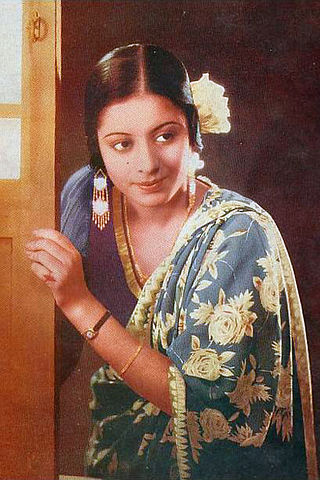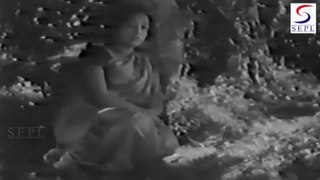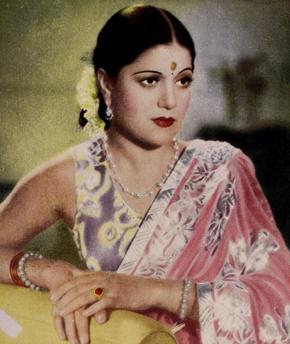Related Research Articles

Pankaj Kumar Mullick was an Indian music composer, playback singer and actor, who was a pioneer of film music in Bengali cinema and Hindi cinema at the advent of playback singing, as well as an early exponent of Rabindra Sangeet.

New Theatres is an Indian film studio. It was formed in Calcutta by producer B. N. Sircar. It was formed on February 10th, 1931. The company motto was "Jivatang Jyotiretu Chhayam," meaning, "Light infusing shadows with life." Sircar preferred to function roughly analogous to an executive producer. He built a processing laboratory, and acquired staff. Once a film subject was selected and a team assembled to create the picture, Sicar ensured that adequate funds were provided, while refraining from interfering with its execution. He made New Theatres a symbol of Bengali cinema's artistic good taste and technical excellence.

Kanan Devi was an Indian actress and singer. She was among the early singing stars of Indian cinema, and is credited popularly as the first star of Bengali cinema. Her singing style, usually in rapid tempo, was used instrumentally in some of the biggest hits of New Theatres, Kolkata.
Dhoop Chhaon or Bhagya Chakra is a 1935 Hindi movie directed by Nitin Bose. It was a remake of the Bengali film Bhagya Chakra. Dhoop Chhaon was the first Hindi film to use playback singing. It was Bose who came up with the idea of playback singing. He discussed with music director Raichand Boral and Bose's brother Mukul Bose, who was the sound recordist in New Theatres, and who implemented the idea.

Zindagi is a 1940 Indian film, directed by Pramathesh Barua and produced by Birendranath Sircar. Starring K. L. Saigal, Jamuna Barua, Pahari Sanyal, Shyam Laha, Sitara Devi, and Nemo, it revolves around Ratan, an unemployed university graduate, and his relationship with Shrimati, who is on the run from her cruel husband.

Meri Bahen is a 1944 Hindi language film. It was the fourth highest-grossing Indian film of 1944. Produced by New Theatres, Ltd. Calcutta, and directed by Hemchander Chunder. It starred K. L. Saigal, Sumitra Devi, Akhtar Jehan, Chandrabati Devi, Nawab, and Tulsi Chakraborty. The music direction was by Pankaj Mullick with lyrics by Pandit Bhushan.

Vidyapati is a 1937 Bengali biopic film directed by Debaki Bose for New Theatres. It starred Pahari Sanyal as Vidyapati. His costars in the film were Kanan Devi, Prithviraj Kapoor, Chhaya Devi, Leela Desai, K. C. Dey and Kidar Sharma. The music was by R. C. Boral and lyrics by Kidar Sharma. Debaki Bose and Qazi Nazrul Islam wrote the story, screenplay and dialogues. The story is about the Maithili poet and Vaishnava saint Vidyapati. The songs of the film became popular and the lyrics though encapsulating Vidyapati's poetry were considered bold for its time. This however ensured the film garnered crowds at the theatres making it a big success of 1937.
President is a 1937 Hindi social romantic drama film from New Theatres. The Bengali version was called Didi. The direction, screenplay and cinematography were by Nitin Bose. The film starred K. L. Saigal, Leela Desai, Kamlesh Kumari, Jagdish Sethi, Prithviraj Kapoor and Bikram Kapoor. The story according to the credit roll of the film is "A tale of love and greater love" developed on an idea by M. M. Begg. It was a love triangle with a social content that highlighted the conditions of the mill workers. It was also the first film to show a liberated educated woman managing her own factory.
Manzil is a 1936 Hindi film from New Theatres. A bilingual made in Hindi and Bengali (Grihadah), it was directed by P.C. Barua from a story by Saratchandra Chattopadhyay. The dialogues and lyrics were by Arzu Lucknowi and music composed by R. C. Boral and Pankaj Mullick. The cast included Prithviraj Kapoor, Jamuna, Pahari Sanyal, Molina Devi, K. C. Dey and Boken Chatto. The story, a love triangle, revolves around two friends Mahim and Suresh and the girl they both love, Achala.

Chandidas is a 1934 Hindi social drama film directed by Nitin Bose. The film was produced by New Theatres Calcutta and was their first big success. It was remake of the 1932 Bengali film of the same name directed by Debaki Bose. This 1934 Hindi version starred K. L. Saigal, Uma Sashi, Pahari Sanyal, Nawab and H. Siddiqui. The music direction was by R. C. Boral with the lyrics written by Agha Hashar Kashmiri. The credit roll of the film states that the film is "Based on the life problems of the poet Chandidas –A problem India has not been able to solve", which involved the caste schism in India. The story revolves around the 15th century poet-saint Chandidas who acts out against the deep-rooted bigotry against caste, untouchoubility and the hypocrisy of society, and a washer woman with whom he falls in love.
Zinda Lash is a 1932 Indian costume drama directed by Premankur Atorthy. The film was produced by New Theatres Ltd. Calcutta. The cast of the film included K. L. Saigal, Rattan Bai, Pahari Sanyal, Mahajabin, Nawab, Kumar and Radharani. The music direction was by R. C. Boral. B. N. Sircar started New Theatres Ltd. Calcutta in 1930 and produced his first film in Bengali, Dena Paona in 1931. In 1932 he produced films in Hindi where he introduced K. L. Saigal to Indian Cinema. The first was Mohabbat Ke Ansu and the second was Zinda Lash both directed by Premankur Atorthy. K. L. Saigal changed his name for his first three films and was billed as Saigal Kashmiri to prevent his family from finding out his profession. This film like his earlier Mohabbat Ke Ansu was not successful at the box office.
Yahudi Ki Ladki is a 1933 Urdu/Hindi costume drama film directed by Premankur Atorthy. Produced by New Theatres Ltd.Calcutta, the cast included K. L. Saigal, Rattan Bai, Pahari Sanyal, Gul Hamid, Nawab and Kumar. The film was adapted from Agha Hashar Kashmiri’s play of the same name Yahudi Ki Ladki which had been written in Bengali as Misar Kumari. He also wrote the screenplay and lyrics. The film saw Pankaj Mullick's debut as a Hindi music director. The dialogues were by Wajahat Mirza. The story revolves around the rivalry and revenge between the Jewish merchant Prince Ezra and the Roman priest Brutus.

Karwan-E-Hayat is a 1935 Urdu/Hindi costume action-adventure film. The film is directed by Premankur Atorthy, with assistance by Hemchandra, for New Theatres Ltd. Calcutta; and it was produced by Lahore branch of New Theatres. The cast included K. L. Saigal, Rattan Bai, Pahari Sanyal, Rajkumari, Shyama Zutshi, Gul Hamid, Rajkumari, Molina, Shyama Zutshi, Siddiqi, Kapoor and Rana. The cinematographer was Krishna Gopal, with music composed by Mihir Kiran Bhattacharya and his brother Timir Baran Bhattacharya, with lyrics by Hakim Ahmad Shuja Pasha. The film, a costume drama, involved the Prince Pervez on the run from an arranged marriage to a princess, only to fall in love with her when they meet in unusual circumstances.
Dulari Bibi is a 1933 Hindi/Urdu comedy film. It was directed by Debaki Bose and produced by New Theatres Ltd. Calcutta. A short 3 reel film it centred on the story of Our Wives. The film starred K. L. Saigal, Molina Devi, Mir Jan and the music was composed by R. C. Boral. It was listening to K. L. Saigal in this film that Pahari Sanyal realised the uniqueness of Saigal's voice as heard through the microphone. He found it more effective, "sweeter", as compared to him singing live.
Rajrani Meera is a 1933 Hindi devotional film. It was directed by Debaki Bose for New Theatres Ltd. Calcutta. The cinematographer was Nitin Bose with music composed by R. C. Boral. The film was a bilingual, made in Bengali as Meerabai and directed by Hiren Bose and Basanta Chatterjee. The film starred Durga Khote, Prithviraj Kapoor, K. L. Saigal, Pahari Sanyal, Molina Devi and Indubala. K. L. Saigal had a small part that of a devotee in the film with Prithviraj Kapoor playing the male protagonist role. The film made Prithviraj Kapoor who played the role of the King of Mewar, Mirabai's husband, a big star and is cited as one of his career's best films.

Daku Mansoor also called Karishma-E-Kudrat is a 1934 Hindi/Urdu costume action drama film directed by Nitin Bose. The film was produced by New Theatres Ltd. Calcutta and the music director was R. C. Boral. The cast of the film included K. L. Saigal, Uma Shashi, Prithviraj Kapoor, Husnbanu, Pahari Sanyal and Nemo. Daku Mansoor was actress Husn Banu’s debut film.
Pujarin is a 1936 Hindi social film. It was directed by Prafulla Roy for International Film Craft. The film was based on a story by writer Sarat Chandra Chattopadhyay from his story "Dena Paona". The film was the remake of the Bengali film Dena Paona directed by Premankur Atorthy. The music direction was by Timir Baran with lyrics by Pandit Bhushan and Kidar Sharma.The film starred K. L. Saigal, Chandrabati Devi, K. C. Dey, Pahari Sanyal and Rajkumari. The story is about a reckless immoral youth who marries for money then deserts his wife due to circumstances, only to return as an aristocrat and reform through the love of his wife.

Sardar Akhtar (1915–1986) was an Indian actress who worked in Hindi and Urdu films. She started her acting career on the Urdu stage. Her early films were with Saroj Movietone, where she did a majority of stunt (action) roles. She came into prominence as the washer-woman in the role of Rami Dhoban in Sohrab Modi's Pukar (1939). As a woman seeking justice for the death of her husband, it was a breakthrough role for her. A popular song she sang in the film was "Kaheko Mohe Chhede". Her career defining role was as a "peasant woman" deserted by her husband, in Mehboob Khan's Aurat (1940), a role later made famous by Nargis in Mehboob's remake Mother India.

Mukti is a 1937 Indian Hindi and Bengali-language drama film, directed by Pramathesh Barua and produced by New Theatres.
References
- ↑ Rajadhyaksha, Willemen, Ashish, Paul (2014). Encyclopedia of Indian Cinema (2, revised ed.). Routledge. ISBN 9781135943257.
{{cite book}}: CS1 maint: multiple names: authors list (link) - ↑ Mishra, D. P. (2006). Great masters of Indian cinema: the Dadasaheb Phalke Award winners-Pankaj Mullick. India: Publications Division, Ministry of Information and Broadcasting, Govt. of India. ISBN 9788123013619 . Retrieved 3 September 2014.
- ↑ Farooqui, Dewan Zubair. "New Theatres Calcutta Renowned Music Directors". members.tripod.com. oldies_club. Retrieved 3 September 2014.
- ↑ "Karodpati 1936". citwf.com. Alan Goble. Retrieved 3 September 2014.
- ↑ Raj, Ashok (2009). Hero Vol.1, Volume 1 Bollywood series. Hay House, Inc. ISBN 9789381398029 . Retrieved 3 September 2014.
- ↑ Nevile, Pran (2011). K. L. Saigal A Definitive Biography. India: Penguin Books India Pvt. Ltd. p. 16. ISBN 9780143414063.